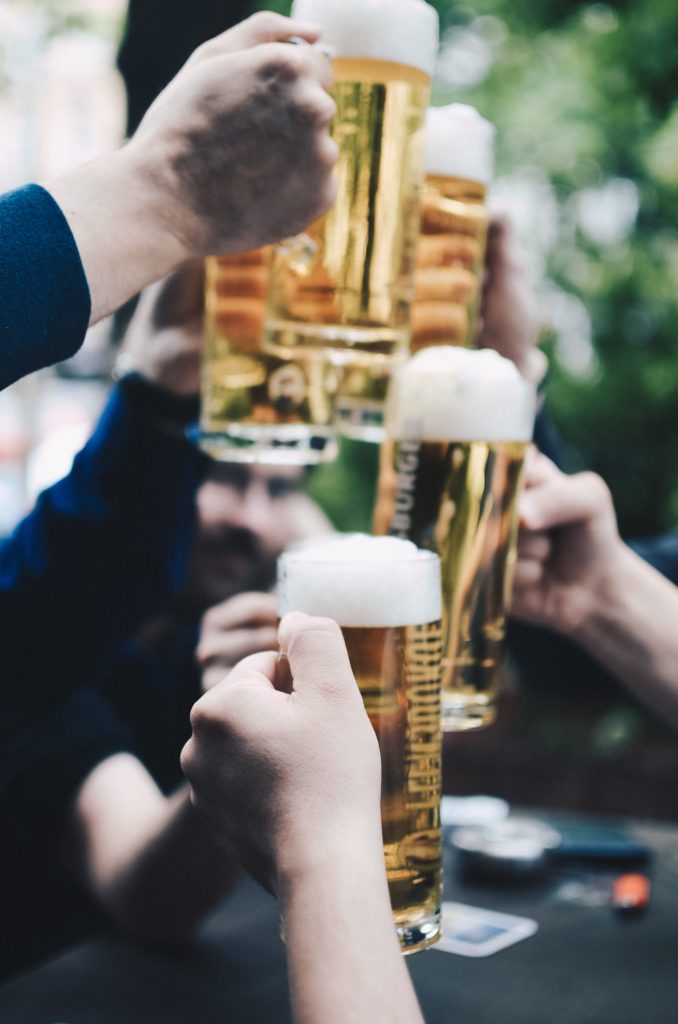Untranslatable German: Feierabend Posted by Sten on Oct 30, 2020 in Culture, Language, Traditions
Es ist 17:00. Endlich! Feierabend. (It’s 5 pm. Finally! End of the work day.) Time to go home, or go by the Kneipe (bar) and get a Bier (beer) to relax and wind down. A typical, almost stereotypical German Brauch (tradition). And Feierabend is the untranslatable word here. Let’s look at what it means and what perhaps could be an English equivalent.
A Celebratory Evening
The Feierabend is the end of the work day – as the Duden defines it: Freizeit im Anschluss an den Arbeitstag (leisure time subsequent to the work day). And it really is just that.
It can be used by itself to say that the workday comes to an end: Feierabend! If you tell Kollegen (colleagues) this, you’re basically telling them: “Come on, let’s call it a day”. Or you can say that you are “calling it a day” with: Ich mache Feierabend! (“I am doing the end of the day!” – freely translated to “I’m ending the work day and I’m leaving!”). But what does Feierabend mean?!
Feier means “party”, and Abend means “evening”. So a literal translation of the Feierabend is “party evening“. It is related to Feiertage (holidays), which are days of Ruhe (rest). Many times, like the Heiligabend (“Holy Evening”, Christmas Eve, the night before Christmas Day), the Feiertag preparations already begin the evening before, so that’s the Feierabend, the evening before a day of rest. That meaning stuck, and the word Feierabend simply became a word to describe the time after work. With the 9-5 work day, which is also normal in Germany, the Feierabend normally begins at 17:00 Uhr (5 pm).
To my knowledge, there is no English equivalent that catches the meaning of Feierabend in one word or with the exact same meaning. Feierabend is specifically associated with resting, winding down, leaving the work day behind and enjoying the evening. The closest comes the simple “end of the day”. But really, the feeling is expressed in different ways, like “calling it a day”, or saying “I’m off” instead of ich habe Feierabend to indicate that you’re not supposed to be working. This brings us to Feierabend as a Präfix (prefix)!
Feierabendbier
It is very common in Germany to have a Feierabendbier (Feierabend beer) after work. Washing the stress and work pressure down with a refreshing, cold Pils. That’s a great preposition for many Germans! And the word Feierabend gives this specific Bier that meaning of relaxation. In that way, Feierabend can do that with many things. Feierabendlauf (end-of-day run), Feierabendspiel (end-of-day game), you can come up with many fun things to do after work! And you can use Feierabend as a Präfix there.
Did you know about the word Feierabend? Do you have a good English equivalent for it? Please let me know in the comments below!

Build vocabulary, practice pronunciation, and more with Transparent Language Online. Available anytime, anywhere, on any device.






Comments:
Fran Levy:
Perhaps the closest translation in US customs and language is ‘Happy Hour.’ That is the custom at many bars and restaurants from 4pm until 7pm for discounted drinks and food. Many people participate after work.
Sten:
@Fran Levy Good one! But Feierabend doesn’t mean that, necessarily. It really specifically is about the time of day after work – that’s the Feierabend. Participating in a happy hour could be one of your Feierabend-activities, for example.
Larry Sall:
A good English equivalent is “Miller time” taken from a Miller Beer commercial.
Sten:
@Larry Sall
Like my answer to Fran, Feierabend is really about the period after work, that doesn’t necessarily involve having a drink; it can be one of the activities. But the “Feierabendbier” is encapsulated well by Miller Time. Never heard of it, nice one, thanks!
Charlie:
Perhaps a good American equivalent might be
“Quittin’ time!”
Alex Bernadina:
Oct first 1986, I (first day in Stuttgart, from Holland) started working in Germany, at the end of this first working day my new colleagues told me Schönen Feierabend! Never heart of it and I started thinking: Is today some kind of holiday? or is there some kind of party? I had no idea. Remember back than there was no internet, no google nothing. By the way, I had the same problem with “Mahlzeit!”….
Sten:
@Alex Bernadina That must have been quite confusing, haha!
Mahlzeit is a great word too! I shortly wrote about it before, but it could actually have its own post 🙂
Here it is